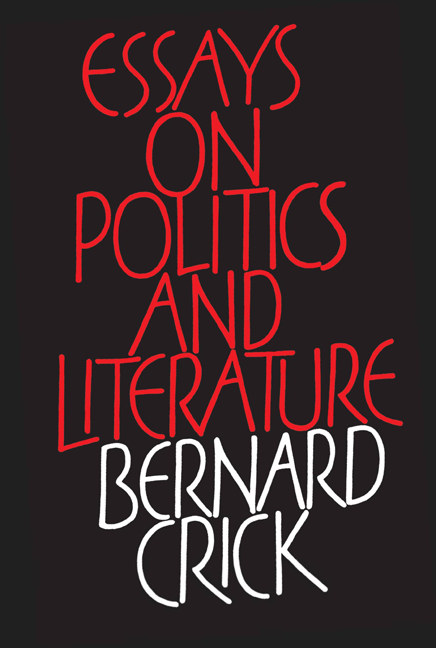Book contents
- Frontmatter
- Contents
- Preface
- Acknowledgements
- Foreword by David Daiches
- One Literature and Politics
- Two The Political in Britain’s Two National Theatres
- Three Young Writers of the Thirties
- Four Koestler’s Koestler
- Five Hannah Arendt: Hedgehog or Fox?
- Six Beatrice Webb as English Diarist
- Seven Words
- Eight My Lse
- Nine Reading The Observer as a Complex Text
- Ten On the Difficulties of Writing Biography and of Orwell’s in Particular
- Eleven Reading Nineteen Eighty-Four As Satire
- Twelve Animal Farm For Schools
- Thirteen Orwell and English Socialism
- Fourteen On the Orwell Trail
- Fifteen Wedekind’s Spring Awakening
- Sixteen Horvath’s Tales From the Vienna Woods
- Seventeen Pinter’s No Man's Land
- Eighteen Polly By Gaslight
- Nineteen Edgar Catches Jenkins’ Ear at the Barbican
- Twenty Barrault at the Barbican
- Index
Preface
Published online by Cambridge University Press: 24 September 2020
- Frontmatter
- Contents
- Preface
- Acknowledgements
- Foreword by David Daiches
- One Literature and Politics
- Two The Political in Britain’s Two National Theatres
- Three Young Writers of the Thirties
- Four Koestler’s Koestler
- Five Hannah Arendt: Hedgehog or Fox?
- Six Beatrice Webb as English Diarist
- Seven Words
- Eight My Lse
- Nine Reading The Observer as a Complex Text
- Ten On the Difficulties of Writing Biography and of Orwell’s in Particular
- Eleven Reading Nineteen Eighty-Four As Satire
- Twelve Animal Farm For Schools
- Thirteen Orwell and English Socialism
- Fourteen On the Orwell Trail
- Fifteen Wedekind’s Spring Awakening
- Sixteen Horvath’s Tales From the Vienna Woods
- Seventeen Pinter’s No Man's Land
- Eighteen Polly By Gaslight
- Nineteen Edgar Catches Jenkins’ Ear at the Barbican
- Twenty Barrault at the Barbican
- Index
Summary
One feels that a volume of mixed essays needs some excuse. Nowadays it is most often monographs or novels or nothing. But I enjoy both occasional writing and more considered essays, and try to put a lot of thought into both. Contrary to the advice I used to give students, about thinking it all out before beginning to write an essay, I usually can only think in the act of writing—but then there is always re-writing. Good political writing is no different from any other creative and critical writing in that respect. Also thought itself is often better represented and runs more freely in speculative essays than in heavily constructed or even hedged conclusions. Critical argument deserves a wider public than the purely academic, or rather academics should try to reach out as well as in: and when one tries to reach out, disciplinary boundaries become hard to observe even if one attached much respect to them in the first place. I am afraid I never have. I always had a sense of being or of wanting to be in a university community more than a department. That is why I respected LSE, who first employed me, but never liked it as much as University College London where I was an undergraduate with friends all over the shop. And that is why I enjoyed writing about Orwell so much and about theatre when a cynical or sensible editor of the Times Higher Education Supplement, Mr Brian MacCarthy (not the present serious fellow), asked me to write’, primarily, I soon gathered, to fill a big page and was surprised but tolerant when I chose to do so on my real love, theatre. I can answer the question if you had your life over again …?’
I could confess to a slight boredom with the academic study of politics by which I earned my bread for many years, and this partly led to me early retirement; but the boredom was decently concealed and to elaborate now might damage a companion volume shortly to follow this, Political Thoughts and Polemics.
- Type
- Chapter
- Information
- Essays on Politics and Literature , pp. vi - viiPublisher: Edinburgh University PressPrint publication year: 2020

